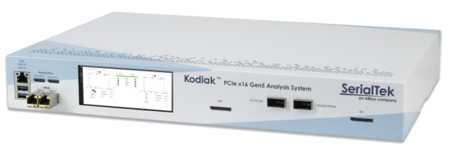SerialTek: Kodiak PCIe x16 Gen5 Protocol Analysis System and Web Application
Addition of PCIe x16 Gen5 to Kodiak analyzer and SI-Fi interposer family brings previously unavailable analysis capabilities and efficiencies to computing, datacenter, networking, storage, AI, and other PCIe x16 Gen5 applications.
This is a Press Release edited by StorageNewsletter.com on March 4, 2021 at 2:16 pmSerialTek LLC introduced an advancement in the PCIe test and analysis market with the Kodiak PCIe x16 Gen5 analysis system, as well as a first calibration-free PCIe x16 add-in-card (AIC) interposer and a new web-based BusXpert user interface to manage and analyze traces more efficiently.
The addition of PCIe x16 Gen5 to the Kodiak analyzer and SI-Fi interposer family brings previously unavailable analysis capabilities and efficiencies to computing, datacenter, networking, storage, AI, and other PCIe x16 Gen5 applications.
With the company’s calibration-free SI-Fi interposer technology, the Kodiak’s design, and the BusXpert analyzer software, users can set up the analyzer hardware, more accurately probe PCIe signals, and more efficiently analyze traces.
Kodiak PCIe x16 Gen5 analysis system
At the core of the PCIe x16 analyzer is an embedded hardware architecture that delivers advancements in capture, search, and processing acceleration. Interface responsiveness is markedly advanced, searches involving massive amounts of data are fast, and hardware filtering is flexible and powerful.
“Once installed in a customer test environment the Kodiak’s features and benefits are immediately obvious,” said Paul Mutschler, CEO. “The user interface is modern, easy to use, and flexible. And in addition to being easy to setup and saving time, the calibration-free design supports ‘real-world’ PCIe link-training between the PCIe host and endpoint, making it more accurate.“
The analyzer supports up to 144GB trace captures and can save trace files directly to the analyzer’s internal storage (up to 4TB), attached storage (USB3.2 or PCIe OCuLink), or can be downloaded via two 10GbE (SFP+) ports or 1GbE (RJ-45) network connections.
“Broadcom is pleased that SerialTek has expanded its test and analysis solutions to the x16 PCIe market with its new protocol analyzer, offering advanced PCIe diagnostic capabilities to data center customers that require more options for better hardware analysis,” said Dan Roehrich, VP, IC development, data center solutions group, Broadcom. “The PCIe ecosystem continues to thrive, with companies such as SerialTek, delivering cutting-edge technologies that enable customers to compute and receive faster access to data.“
PCIe x16 Gen5 SI-Fi interposers add convenience and simplify setup
SI-Fi interposer probes expand coverage to enable testing in critical areas, including link training (LTSSM), power management, hot plug, reset, and other situations where the physical lane characteristics may change. The PCIe x16 Gen5 SI-Fi interposer is accurate electrically and simple to use. It is designed to secure the customer’s device safely and connects to the Kodiak analyzer via high-quality QSFP-DD cables. No tuning (calibration) is required. Host and endpoint signals pass through the interposer, allowing for real-world PCIe link training and easier setup. Competing PCIe analyzers and interposers typically require tuning, or calibration, which can lead to reliability issues as modern PCIe link training sequences can occur dynamically, not just at boot-up. With SI-Fi technology and Kodiak’s adaptive EQ capabilities, users can save hours in setup time. If link characteristics change (e.g., Hot Plug or NSSR), Kodiak can follow those changes dynamically, ultimately saving the user’s test.
PCIe Analysis from Web browser or BusXpert Electron App
Combined with the BusXpert user interface, the PCIe x16 Gen5 analyzers features and benefits are accessible. Based on a new embedded software framework and REST API, BusXpert integrates with Kodiak hardware. Accessed via a web browser or the company’s Electron-based app, BusXpert includes a suite of powerful triggers, filters, and trace processing capabilities coupled with a new user interface for fast, easy, and reliable decoding. Users can work with trace files collaboratively in real-time and remotely verify proper configuration of the analyzer and interposers, including visual identification of cables, link status, recording status, and much more. The REST API makes automation straightforward and efficient, providing programmatic facilities for monitoring and capturing traffic, statistical analyses, and detailed searching. Kodiak’s hardware design also means there is no need to download a multi-gigabyte trace before the user can begin to review the analysis – data is ready immediately.














 Subscribe to our free daily newsletter
Subscribe to our free daily newsletter


